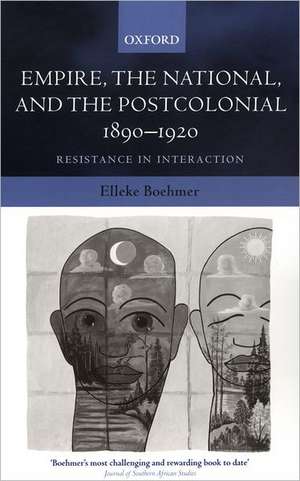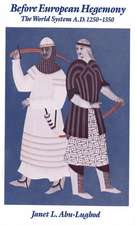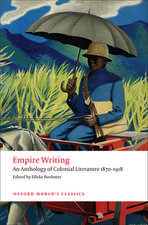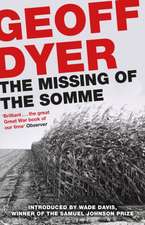Empire, the National, and the Postcolonial, 1890-1920: Resistance in Interaction
Autor Elleke Boehmeren Limba Engleză Paperback – 6 ian 2005
| Toate formatele și edițiile | Preț | Express |
|---|---|---|
| Paperback (1) | 297.50 lei 31-37 zile | |
| OUP OXFORD – 6 ian 2005 | 297.50 lei 31-37 zile | |
| Hardback (1) | 333.06 lei 31-37 zile | |
| OUP OXFORD – 7 mar 2002 | 333.06 lei 31-37 zile |
Preț: 297.50 lei
Preț vechi: 364.73 lei
-18% Nou
Puncte Express: 446
Preț estimativ în valută:
56.93€ • 61.82$ • 47.82£
56.93€ • 61.82$ • 47.82£
Carte tipărită la comandă
Livrare economică 11-17 aprilie
Preluare comenzi: 021 569.72.76
Specificații
ISBN-13: 9780198184454
ISBN-10: 019818445X
Pagini: 252
Dimensiuni: 139 x 216 x 14 mm
Greutate: 0.33 kg
Editura: OUP OXFORD
Colecția OUP Oxford
Locul publicării:Oxford, United Kingdom
ISBN-10: 019818445X
Pagini: 252
Dimensiuni: 139 x 216 x 14 mm
Greutate: 0.33 kg
Editura: OUP OXFORD
Colecția OUP Oxford
Locul publicării:Oxford, United Kingdom
Recenzii
Review from previous edition This formidably well-researched and carefully documented book demonstrates the strengths of a complex comparative methodology in postcolonial studies.
Empire, the National, and the Postcolonial strikes an excellent balance between theory and historical documentation. Boehmer analyses new materials alongside canonical texts, making it a very original contribution to the postcolonial field. Most importantly, it decentres the monologic narrative of imperialism, whose success greatly depended upon imposing a framework of binary opposition between the centre and its peripheries. . . . The book provides us with a fresh alternative, and a possibility of reading resistance between the margins.
This book is infinitely rich in detail, but sustains it with a broad and challenging thesis. It invites us to begin to think about the Empire not only as a discrete series of colonial events linked only through their common resistance to the imperial center, but also as a network of interacting nodes in a living and shifting historical and cultural exchange with multiple routings and dimensions.
Boehmer's most challenging and rewarding book to date. Her encyclopaedic knowledge and sensitivity to textual detail . . . combine excitingly with her impressive theoretical dexterity and ambition.
Empire, the National, and the Postcolonial strikes an excellent balance between theory and historical documentation. Boehmer analyses new materials alongside canonical texts, making it a very original contribution to the postcolonial field. Most importantly, it decentres the monologic narrative of imperialism, whose success greatly depended upon imposing a framework of binary opposition between the centre and its peripheries. . . . The book provides us with a fresh alternative, and a possibility of reading resistance between the margins.
This book is infinitely rich in detail, but sustains it with a broad and challenging thesis. It invites us to begin to think about the Empire not only as a discrete series of colonial events linked only through their common resistance to the imperial center, but also as a network of interacting nodes in a living and shifting historical and cultural exchange with multiple routings and dimensions.
Boehmer's most challenging and rewarding book to date. Her encyclopaedic knowledge and sensitivity to textual detail . . . combine excitingly with her impressive theoretical dexterity and ambition.
Notă biografică
Elleke Boehmer is the Chair of Colonial and Postcolonial Studies in the Department of English and Media at Nottingham Trent University, and Director of the NTU Centre for Colonial and Postcolonial Studies. She has published Empire Writing (Oxford World's Classics, 1998), Empire, the National and the Postcolonial 1890-1920 (2002), and critical editions of Robert Baden-Powell's Scouting for Boys (2004) and Cornelia Sorabji's India Calling (2004). She is also the author of short stories and three novels, most recently Bloodlines.












